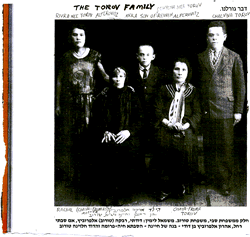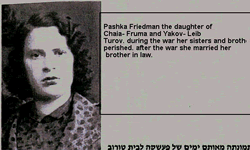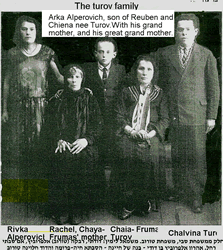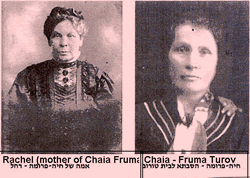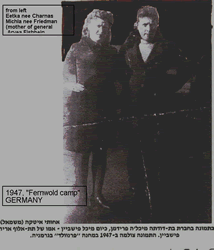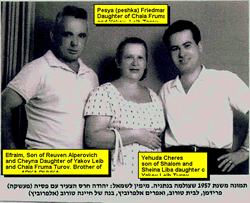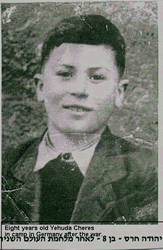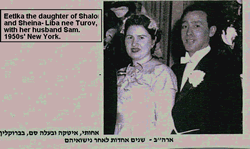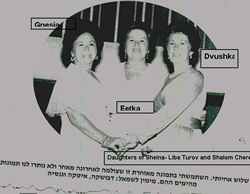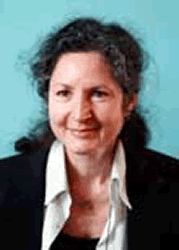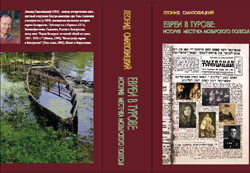By David Katz
In Yehuda Cheres’s book "Veha-ayra Boeret" there is a story by David Katz, a neighbor of the Torov family in Kurenets. The story is about the Torov family, here is some of it...Leib Yakov Torov the glass maker (in town he was known as Leib Yankov dar glazer) lived on the very last house on Myadel Street with his very large family. Leib Yakov Torov and his wife Chaya Fruma were devout Jews and deeply observant. They had six daughters and three sons in Kurenets.... Seven of the children were married and had their own children and they all lived on the same street... Every Shabbat after the prayer Yakov Leib would visit each of his children to taste some of their "Chamin".
First he would visit the eldest son Nachum who lived next to the prayer house. Nachum had five boys and one girl each one of them was both Smart and talented, I especially remember Levi Yitzhak who was the best student in third grade and was beloved by all. The entire family perished in the Holocaust, not one left.
Next he would visit his son Chelvina with his two children, the Germans killed the wife and the children in 9-9-1942. Chelvina was at that point in the Vileyka camp and a few months later He and his brothers’ son were able to escape and reach the partisans. He was later killed during a German blockade in forest. The Third was his daughter, Chana and her husband Yosef Fridman from Dolhinov and their three daughters the entire family was able to escape to the forest and live there in hiding but Chana was shot and killed during a blockade. After the war Yosef Fridman and his daughters moved to Israel and Yosef married Chana’s sister, Pesia whose husband was killed. They have a great big family in Israel now. Next to Chana Fridman lived her sister, Rivka with her husband Pesach the Baker and two children. the entire family perished.
half way on Myadel Street lived the daughter Sheina Liba with her husband Shalom Cheres and their four children; Dvushka, Yitka, Genesya and Yehuda..... the family escaped to the forest in 1942 and hid there for more then two years... one winter night Sheina Liba and Chaya- Lea Alperovitz went back to Kurenets to get clothes and food for the children. they were caught by German collaborators and tortured but refused to tell where the Jews were hiding. So they were killed on the spot, the rest of the family survived....They live in Israel and the U.S.A.
.. The last to be visited was the oldest daughter, Chyena, her husband Ruven Alperovitz and their six children. Their son Arka attacked a police man while taken to be killed, he managed to run but later was shot and killed. Only one son survived, Efraim, he was studing in Russia when the war started. Later he moved to Israel.....,
The last son, Moshe, lived at home.... most of the family including Lieb Yakov and Chaya Fuma Torov were killed on 9-9-1942 with most of the kurenets Jews.... out of family of 41 people, 27 perished.....
In Russia (1877 - 1900)
Nisan Torov
(from "The book of Torov")
I was born on August 15th (according to the Russian calendar - August 2nd) in 1877 in the town of Nesvizh, iistrict of Minsk, that has been described will by L. Livanda in "City and Fright", to simple and honest parents. My father (was born in Slotzk), Shmuel Leib Torov knew Russian and the bible (and our old literature in general) therefore he ws somewhat involved with the Enlightenment movement. He stayed most of the year in Moscow, buying there all kinds of cheap merchandise and shipped them to Nesvizh for sale. My sickly and clever mother with her special talent for imitation was Zisya-Leah Mekler Z"L. She was a daughter of a famous merchant in our town Timkovitz who was known as a "consultant" (an advice giver).
My parents (so I understand now) lived all of their lives in modest austerity. According to the precepts of the time and place they were considered affluent. In their house, the Russian language was spoken regularly. My older sister who was very beautiful and had wonderful talents drew to our house some of the prominent figures of our town. The doctor, pharmacist, the teacher representing the government, and from time to time also students from the capital. Our house was considered an "aristocrat" house. Religiously I did not feel any pressure from my parents. They did go on holidays to the synagogue (These were happy days for all of us since my father came home to be with us then) and conducted themselves according to tradition, but with no particular passion.
With the vigorous effort of my sister, my older brother was sent to study in the Russian academy in Slotzk when he was ten. His uniforms, with glittering buttons, were shown off when he came to visit us on holidays. They left a deep impression on me, his brother (younger than him by 6 years). But the truth must be told: not only the uniforms and his old copper watch my father gave him were the objects of my envy. I desired his education. The desire to learn was awakened in me early in life, but was not satisfied. My elder sister got married and moved away. My parents did not see it as an obligation to provide us with education; maybe they could not afford it (I had another older sister and a younger brother). Maybe there was another reason for this: my mother was attached to her children and refused to let them go. I remember, when my brother went back to his school at the end of vacations, she would faint occasionally out of sheer sadness.
All of my "systematic" education was merely based on my studies in the cheder (Torah classroom for children). I managed to study quickly the Bible and a little Talmud and that was it. More than that wasn't necessary according to our status. "They never intended to make me a Rabbi..."
At this point of my life I had the good fortune of meeting Simcha Chaim Vilkomitz from my town. He was older by few years and studied in the Mir Yeshiva. He was a delicate and serious young man, and had even then a good knowledge of Hebrew literature; he could write well and was an avid Zionist. He became close to me and influenced me greatly. Among other things he encaouraged me to learn and study Hebrew, recommended books and provoked my thinking by raising national questions. One of the first readings he and I did was an article by Mordechai Ben-Hillel ha'cohen in memory of Peretz Smolanskin. These things made an enormous impression on me. I started to read and even write in the style of certain writers. Slowly, as the years past, I came to know all great Hebrew writers of the era, and loved it with all my heart.
I also studied the Russian language. I wasn't sent to school. I was given a tutor, and after I had learned some grammar from him for few months he admitted that I have reached the limits of his knowledge. I started to read Russian classics, and Gogol, Lermontov, and Turgenyev captured my heart. My brother sent from time to time books from the academy in Slotzk. Books on nature, which I devoured. I even studied the "Cosmos" by Humboldt with a friend. Many nights I spent going over Hebrew grammar, but the complicated rules were too much for my friend's comprehension, and he would fall asleep on the table, until I would wake him up to go home. It is appropriate to mention that every time I finished an interesting book, I would cry bitterly for the pleasure that was over. Ever since my childhood I was dominated by some strange desire - almost metaphysical, to the eternal, and I was frightened by the nothingness of death.
This is how I had to acquire, with much effort, some general knowledge and some Jewish studies, without any method, without order and under very hard and humiliating conditions. Because a small injustice was done to me: I was put to work in the store since I was a very young boy. I was destined to spend my days selling cheap merchandise to old women, farmers and soldiers. The store was my mother's store, but she was ill and coughed all the time. My other sister who stayed in the house was lazy and played sick, and the other brother was too young - so I was chosen to be sacrificed.
Page 235
It is hard to describe my torture in words. My soul aspired to greatness.My mind dreamed of experiencing greatness with the valiant creators of the Hebrew and Russian literature. I reached to the stars. Instead of all of this - not only I wasn't given the opportunity to study systematically as did my older and happy brother, but they are also forcing me to become a petty merchant. I felt very miserable with myself. I became a great pessimist and I let my bitterness spill through vigorous Smolansky type metaphors, that my counselor Vilkomitz was very fond of. It was liked especially by my fellow students of Hebrew and some other friends, who like me, dreamed then about literature and immortality.
Every day, from morning to evening, I was seated the store. I would use every available moment to read and write - business wasn't that hot, and available moments abounded. Not once my fingers practically froze from the intense cold temperature (we did not have a heater in the store) but I did not leave my books, nor did my hand let go of my pen. In the evenings I continued to study and also to bitterly cry in hiding over my hard lot. Of all of my desires, not one was fulfilled. One of them was the hardest to handle: this was my desire to draw and make art. Where did this one come from I do not know for sure. Maybe it was my heritage, since my family on my father side was blessed with architects: the great-greatfather, some of the uncles and some of their sons. It was also told about the grandfather of the great-greatfather, that he built the synagogue in Torove in Minsk county, and this is why they named the town after him. Whether or not this is true, my impressionable soul was captured by shapes and colors. I would spend hours on end drawing men and women and animals of all kinds on sheets of paper that were scribbled and used on one side. Some of my drawings won accolades from viewers and some even were part of our apartment décor. However, even here I was lacking guidance and instruction and felt that I am wasting my energy for nothing. So this is how things were, until finally our little store, the defiler of my childhood, was closed down and the entire family moved to Moscow. I was then only about 12 years old.
In Moscow I did not live with my parents. I lived with my older sister Chanah, who did not see happiness in her life. She did however manage to persuade one of my relatives, a cousin that studied architecture in the school for drawing, to help me.
From Our Images
In the memory of my grandfather Rabbi Chaim Shifres HY"D (May H'shem revenge his blood) and his family that perished.
Until this day I can recall Nesvizh in my memory, just the way I left it in the 1930's. A dreamy village bathed in meadows, wooden crosses on roadsides, old castles and magical lakes. A village with meandering roads, here and there also a swamp, very old synagogues, tax collectors, matchmakers, poor and paupers of all kinds.
The synagogue courtyard and in it centered most of the synagogues, a kind of depressed melancholy is spread upon it. Here in the middle of the square, was Rabbi Beryl Chazkels, who served as a supervisor in the Talmud Torah, delivered his eulogies to the deceased. He was a Jew with an impressive appearance, long white beard, standing on a wooden podium and surrounded by crying women and mourners, he would lift his face upwards, closed his eyes and say: "Rabosai, s'iz avek fon uns..." ("Friends, he has left us, he has passed away...")and after that there were bursts of crying and wailing.
Rabbi Rozovsky
From all the Rabbis and schools I went through, more than any other was etched in my memory Rabbi Rozovsky, or the way he was nicknamed "Der alter Razovsky" (Old Razovsky), to differentiate him from his son Yoel Rozovsky, who was the head of the community, and his image resembled the image of Theodor Hertzl.
Despite of the fact that from time to time we felt his strong arm and the mischievous among us even received beatings accompanied by names: "Lopetnik" (shoulder blades), "Shtate Ganev" (town thief), etc. I liked him and until this day his image remained as a shining fatherly personality. He planted in me the affinity to the book of books, as images from the Tanach floated in my world. Abraham and Sarah, Yirmiyahu suffering in the yard as a prisoner, Rut and Neomi in the fields of Boaz in Beit-Lechem. And, true, on occasion, we felt his narrow mind about anything new or anything that was to us a breath of fresh air.
We had a Polish teacher and her name was Grovertova. A beautiful young woman. Her eyes sparkling with fire and all of her appearence was just a declaration of feminine magic. Our class was close to the teacher assembly room, and every time she went by, most of the time in the middle of a Torah lesson -our eyes were glued to her walk and exposed arms like fainted butterflies. Something tender and sensual went through us. But Rabbi Rozovsky used to turn his head from her, spit and shout: tfu ! We, the children were looking upon him with wonder and trepedation.
Berl Alperovitz HY"D
Berl Alperovitz HY"D , the son of Rabbi Mordechai Daviv, was my favorite and admired friend out of all of my friends in Nesvizh. They lived not far from my grandfather's house. I can still remember the large picture of the Nesvizh fire department hanging in their house. Gentiles and Jews seating together with helmets on their heads. Berl, my friend, would point with a bit of pride to his father, Rabbi Mordechai David seating in the middle, next to Kamutzky the Cossack with the bushy moustache.
Berl was a bright and lively child. He had a soul of a poet and from time to time he composed songs in Yiddish, even with a melody. I remember one summer day I found him in his house bending over his notebook. "Listen Zvi - he turn to me - I will read to you my new my new song": His song described the joy of life and beautiful landscapes and nature, and afterward darkness of storms and calamities which erase the entire universe.
I was shaken by this dark pessimism, and he replied with sadness: "Die ganze velt vet veren farshvemen..." ("The entire world will be flooded...."). He prophesized and did not know what he is saying. A few years later the war erupted and the horrible Holocaust took place. He perished too.
R. Chaim Shifres
Many residents in Nesvizh knew my grandfather, Chaim "the Nishvizer". I was normally called "the grandson of R' Chaim from Nesvizh. And if a Jew would ask: who is R' Chaim "the Nishvizer"? They would answer him with a question: "and who doesn't know R' Chaim "the Nishvizer". The one who has a son in Palestina, he is a Torah reader in the old synagogue and who lives in Michlishok next to Pessya the Lady Baker.
R' Chaim was known as a learned and cultured man. Despite his religiosity he favored writers of the Haskalah, and in his library you could find next to the Sha"s and religious books also books by Mendaly and Yehuda Leib Gordon. Page 243
.....in that confusion were trampled upon R' Aba Tenenboym the Chasid, and R' Abraham Itzhak Mahler. Also the grandmother, which we loved so much, Perla Mashvitzky. She was blessed to be 108 years old, and until her last day took the needs of the poor to heart. She was trampled by that same crowd. This is Perla, the mother to all the poor and the meek in Nesvizh and this is her end!
The Judge Shlomo Levin
Second to our kinsman Shimon the teacher, who was attracting me to the Tailor's Synagogue, was the Rabbi of Poalei Tzedek, the dayan R' Shlomo Levin, who was one of the better known "Magid's" (preacher) in our places. (He was the author of the "Drash" "Hadar Hacarmel" in two parts).
When R' Shlomo Levin was about 35 he was appointed a Judge in our town. He was a short man, his face crowned with a dark brown beard. His brown eyes were framed with glasses. The corner of his mouth often turned in a bitter smile. His clothes and high-heeled boots were always clean.
On account of R' Shlomoh Dayan, the Magid of the Synagogue of Poalei Tzedek flourished. On Shabat and holy days it would draw people from the entire city. Not only artisans went there, but also those who studied Torah full-time were attracted to listen to the Magid's sermon.
R' Shlomo the Judge was a great preacher, enthusiastic and had the talent to admonish in a graceful way. He could capture the attention of his audience for three hours or more. He had a special melodious voice, a pleasant and sad melody he used on special moments of elation. He also knew how to bring humor and levity to his sermons. Entertaining stories and word pictures illustrated the lives of our forefathers, and were used in his talks as examples we should all strive for. His illustrations were based on traditional writings but served as outlet for his own fruitful imagination.
The audience was as putty in his hands. He lifted their spirits with stories on the nation of Israel and its virtues, and when he wanted, he brought them to tears and crying bitterly, whipping them with his sharp tongue and reminding them their sins to each other, and sins to G-d.
The sermons of the Dayan R' Shlomo allured me in my childhood with magic strings. Because of my desire to listen to these sermons I was able to overcome my fear of being near Leibush.
I especially remember one of the sermons he gave on Saturday night, the first night of reciting Selichot (Penitential prayers begun before Rosh Hashanah) the Synagogue was full of people. The women side was also crowded. The coming "Yamim Noraim" were felt in the air. The sermon was intended to awaken the souls of the people to repent before the Day of Atonement. And awaken it did.
The sermon came to a climax when a heart wrenching fable and its moral were told. R' Shlomo started to spin his story with his sad-pleasant melody:
"It is a tale about a father who died and was laying on the floor covered with a black cloth with silver lining on its edges. His baby son is seated at his father's body. Not knowing or comprehending what had happened, the baby was playing with the silver fringes of the cloth covering the body of his father. The mother comes in and starts crying and weeping. She says to the baby: My son, my son, don't you that your father had just died and is lying here dead in front of you? You are now a pitiful orphan and you are playing with the silver lining of this cloth!"
Here the Magid raised his splitting voice and cried out:
"Gentlemen! Here we are at the beginning of Yamim Noraim. The day of judgement in coming fast. On Rosh Hashanah it will be written, and on Yom Kippur it will be sealed. Who will live and who will die, who's end will come and who will live another year? Who among us knows his verdict? Who knows how many of our beloved parents will still be alive next year? It is very possible that on some of them the black garment is already being spread. And here we are, what we are doing on the days just before the day of Judgement? We are just like the baby playing with the silver tassels of his father's garment. We spend our days and nights dealing with the vanity of this world, we chase after money and greed, instead of waking up to do good deeds that will serve as a barrier to protect us. Let us take upon ourselves to completely repent and start on our way to better ourselves. Let us cry out in prayer to ask forgiveness on us and our loved ones that they shall not die."
As the story was heard, a flurry of emotions took over the crowd. Many cried with tears. The women cried loudly.
When I heard the parable about the black garment, my eyes were drawn automatically to Leibush, the "Chevra Kadisha" (Burial Society) service person. He frightened me with his black garment he always carried, ready to wrap up the next dead person.
Leibush stood bent over the railings of the pulpit and tears would blow from his eyes.
At this moment I overcame the fear I had from Leibush the "death man". He was no longer the man with the raging frightening face and eyes, the gravedigger of babies. He became just a man, a Jew, who is just as afraid of judgement day as I was.
The Keepers of Tradition
Yoel Rozovsky and Baroch Shmoshkovitz came to Nesvizh and became acquainted with the Zionist youth in our town, they became very close with Benyamin Isenbud and tied themselves to him with deep friendship. Many similarities existed between the three. They were all progressive Zionists, democrats by nature. They were folksy and popular, and they wrapped Zionism and Hebrew culture together. That was the reason for the concern, great care and energy they expanded into Hebrew education in our town.
Because of these characteristics they were able to foster a new generation of Poalie Zion (Workers Of Zion) who carried on the work in Nesvizh (as it continued in other towns) with the awakening of the Zionist movement after the Balfur declaration.
Even though those three aspired for high goals, they knew how to deal with the mundane as well. They stayed on their guard in the hard years that arrived after the death of Hertzel and the years right after the clampdown on the revolution of 1905. The spirit ofdemocracy and aspirations for progress also stirred within then in middle age.
These were hard years for the Zionist movement. The Russian government prohibited any free _expression or gathering. The police did not make any distinction between gatherings. To them any gathering was suspicious.
The disappointment filled the hearts after the suppression of the revolution. Some of the Jewish socialist youth in our town from the Bund, Socialist Zionists and Poalei Zion were among the disappointed. Some had left the Zionist cause all together to become assimilated over time. Some of the people in our town completely abandoned Judaism, sold themselves to the life of this world and gave up any semblance of Jewish humanity.
Page 244
The three veteran-Zionists in our city, Benyamin Isenboud, Yoel Rozovsky and Baruch Shmoshkovitz, knew how to encourage and overcome weakness, how to push forward - the kind of work that was done in hiding in those days.
This blessed trio remained for many years the address for every Zionist and Hebrew project in Nesvizh. To them were letters and announcements directed. They were the ones to take care of the sale of Shkalim to the congress, introduction of the blue and white box of the national fund to every house in the city and placing the collection balls in the synagogues on the eve of Yom Kipur. If a national preacher came to town they were the first to guide him and direct him and would make an effort to grant him permission to preach even in the municipal synagogue, the Cold Synagogue, that a portion of its operation cost was covered by the city's treasury.
On occasion, when a Hebrew newspaper distributor, or Hebrew publisher such as "Achiasaf" and "Tushiah" arrive in town, he would contact them, and they would do their best to help him with his dealings with the community. They also sponsored great balls to benefit the Zionist movement in our town. This blessed trio guarded the fire of the Zionist movement in Nesvizh so it will not be extinguished during the bad years. They were also blessed to be able to fan the fire when the tide turned and better days of great deeds arrived again.
The crown of their labor in spreading Jewish education and knowledge of the Hebrew language in our town, was the establishment of a Hebrew school named after Dr. Yechiel Tshelnov, later known as "Tarbut School". They did a great work to maintain, develop and widen its influence. They continue to take care of the school even after many other devoted members from the Zionist Youth became closely involved in this holy work.
Among these young people that stood out in the beginning was Moshe Shteinhoise who immigrated to Eretz Israel as a pioneer in 1920, and especially Benyamin Yavelevsky (Yoeli) who served for 15 years as the head of Young Zion in our town, until he made Aliyah in 1934 and settled in Jerusalem. He works as a librarian in the Hebrew University National Library. Many sought to move to Palestine, the United Staes orother countries.
The first principal of the "Dr. Tchelnov Hebrew school " was Mr. Moshe Melnik Z"L. He was a very talented teacher as well as an exemplary organizer. He was devoted to the school with all his heart.
In the years 1919-1920 I was a teacher in the school, during which time more than 100 students of all grades in Nesvizh received Hebrew and general education.
The Hebrew school, with the Hebrew library at its side, served as a center for all Hebrew and Zionist project in town. Around the school were concentrated the best young people who cherished the Hebrew language and literature, and pioneering in the land of Israel was dear to their hearts.
The three did manage to see in the beginning of 1920 the first group of pioneers of young men and women from Nesvizh who journeyed to the land of our forefathers to join thousands of pioneers who turned the wasteland of the homeland to a blooming garden.
The three parted with tears of joy from the first group of pioneers and sent them on their way with blessings from the yard of the school. There was much more to accomplish by the three in the last years before the Holocaust, when tough times came for the Jews of Nesvizh. On their backs were the Polish governors, who perceived Nesvizh as a border town under their control.
R' Yoel Rozovsky filled a very difficult and responsible duty in those years. He was elected to the position of head of the community. He also was a member of the city council.
Yoel Rozovsky did not ask for authority. He wanted to serve. He wanted to serve his brothers and better their lot. He filled this position with all his soul and might, with self-sacrifices.
The Polish governors often renewed their hard decrees on the Jews. The tax burden was too hard to bear. Many of the middle-class collapsed and were looking for a way out by immigrating to Eretz-Isrzel or America.
Yoel Rozovsky, as the head of the community, stood tall and stretched his brotherly hand to those in need. He did much to help the youth and poor to get them out of trouble. He helped in spirit and materially and saved from certain destruction hundreds of Jewish brothers from our town and elsewhere.
The pioneering spirit that spread from the land of Israel to the Diaspora touched the best of Nisviz' youth. Some of them were organized in chapters of Gordonia" and "Ha'shomer Ha'tzair". The letters arriving from Degania B' written by one member of the first group of pioneers who came out of Nisviz', Moshe Shteinhoise (Ben-Artzi) encouraged them and gave them strength to wait for the day they too will go to Eretz-Israel and will join the pioneers. Many of them did go to Israel and joined its builders.
The first group of pioneers from Nisviz' included the teacher Shifres and Lipha Barbada the humbled dreamer (who was later known as Levi Ben-Amitay, the poet from Degania B') both of them were born in Lachovitz. L. Barbada visited the academy in Nisviz' for several years and was a member of Young Zion group in our town.
During those years Baruch Shmoshkovitz also managed to have his life dream come true. In 1935, just a few years before the Holocaust, he immigrated to Israel with his family. He lived to see the establishment of the state of Israel and lived in it for 6 years as a proud and free citizen. His sons too were part of the struggle to build the state and fought in the war of Independence.
Dr. Benyamin Eisenbod, whose entire life was devoted to Zion and Hebrew, and who held in his house the archives of the Zionist movement in Nisviz', made also plans to immigrate to Eretz-Israel. But for him it was too late. He, who dedicated all his life to the Zionist movement, perished with his delicate wife and all his family, together with all the thousands of pure and holy Jews of Nisviz' during that dark day, the day of the slaughter, 9 Cheshvan, 1941 (October 30, 1941), T SH "B.
This paragraph is a continuation of page 233 which ends with the following statement:
This is how the descendents of a large family from Nesvizh scattered around the world. Today there are no Jews in Nesvizh and who knows if the buildings that old R' Sander built are still there, and if they are, what they are used for?
Naftali Herzog
Ivan Torov
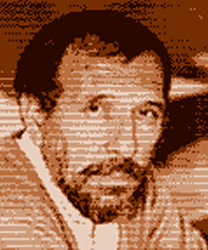
Ivan Torov, Politika's journalist, is the 12th laureate of this award.
Short-listed for the honors were also Ljubomir Zivkov of Vreme Weekly
and Vlada Milic journalist of TV Mreza.
Media on media, 01/27/2003
JUG GRIZELJ AWARD GOES TO IVAN TOROV
This year's Jug Grizelj journalist award for the largest achievement in
investigative journalism aimed at developing friendship among the peoples
and removing the borders between nations has been given to Ivan Torov
by the decision of a jury comprising Dusan Simic, Zivorad Kovacevic, Elena
Krstanovic, Nenad Stefanovic and Velimir Kazimir Curgus.
Medija Centar Beograd
Milica Torov http://www.danas.co.yu/
The organization "Reporters Sans Frontiers" today sent a letter
to the Chairman of Serbian Parliament Dragan Tomic in which they strongly
protest against the way the Serbian administration has treated Milica
Torov, journalist of the independent daily "Nasa Borba." The
letter states that on December 25, the head of the Parliament's Press
Department treated Mrs. Torov indecently, by calling her names and throwing
her out of the room. "Reporters Sans Frontiers" have asked Mr.
Tomic for an explanation of the incident.The Independent Journalist Association
of Serbia (NUNS) condemned the government's actions against their colleagues
and announced that they will seek protection from the international journalist
associations.
1976, 90 minutes
Action/Adventure
Len Cariou, Don Francks, Sarah Torov, Calvin Butler
An ex-junkie helps the police in their attempt to smash a drug and prostitution ring. As he gets closer to the men behind the big-money deals, he becomes increasingly involved with the problems of a beautiful runaway.
Last Name: Torov. Country:
Slovenia. Username: MGToro. Date Joined: 2001-11-09. Status: User.
http://www.jewishgen.org/yizkor/nesvizh/nes234.html#Nisan%20Torov
see this link above, it is a partial English translation from the “Book of Torov� by Nisan Torov (also spelled in USA as Touroff)
He is my great-great-uncle. His younger brother, Abram or “Archie� was my great-grandfather. Nisan and his 2 brothers all made it to the USA, his two older sisters and parents stayed behind. I often wondered what happened to them.
Any chance we are from the same greater-Torov clan?
Adam Glassman
PS: see top of 5th paragraph down in this link below, an architect Torov is mentioned, and in “The Book of Torov� Nisan spaeks of architects in the Torov clan. Does anyone know anything about this? As an architect myself, I am especially intrigued by this.
http://www.hotels-kiev.com/krestchatik.htm
_________________________________________________________________
Pfeufer/Richardson PC Architects
700 Massachusetts Avenue, 4th Floor
Cambridge, MA 02139
www.pfeuferrichardson.com
Please, note about Turov book to all your colleagues and friends interested in Belarus shtetl history.
My additional papers in English dedicated to Belarus Jewish history is possible to see at:
http://www.jewishgen.org/Belarus/newsletter/authors.htm
Faithfully yours,
Leonid Smilovitsky, Ph.D.
smilov@zahav.net.il
